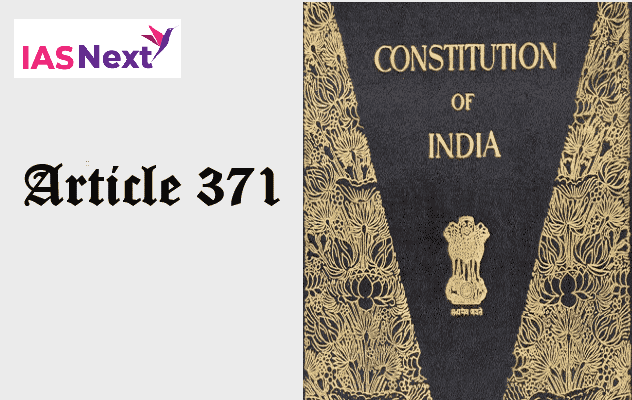CURRENT AFFAIRS
Get the most updated and recent current affair content on Padhaikaro.com
Article 371 of the Constitution
- IAS NEXT, Lucknow
- 26, Mar 2022

Reference News:-
Arunachal Pradesh Chief Minister Pema Khandu is planning to lead an all-party delegation to New Delhi soon to seek amendment of Article 371 (H) which has special provisions pertaining to the state in order to place it at par with special provisions meant for Nagaland enshrined in Article 371 (A) of the constitution.
Other demands:
The special provision with respect to the state should be further strengthened by amending Article 371(H) by inserting provisions for protection of religious or social practices of the tribes of the state, customary law and procedure of the state’s tribes, administration of civil and criminal justice involving decisions according to customary laws of the tribes and including provisos to protect local ownership and transfer of land and its resources.
This is necessary to protect tribal rights and customary laws.
What is Article 371 all about?
Articles 369 through 392 appear in Part XXI of the Constitution, titled ‘Temporary, Transitional and Special Provisions’.
Article 371 of the Constitution includes “special provisions” for 11 states, including six states of the Northeast.
Articles 370 and 371 were part of the Constitution at the time of its commencement on January 26, 1950; Articles 371A through 371J were incorporated subsequently.
Overview:
- Article 371, Maharashtra and Gujarat:
Governor has “special responsibility” to establish “separate development boards” for “Vidarbha, Marathwada, and the rest of Maharashtra”, and Saurashtra and Kutch in Gujarat; ensure “equitable allocation of funds for developmental expenditure over the said areas”, and “equitable arrangement providing adequate facilities for technical education and vocational training, and adequate opportunities for employment” under the state government.
- Article 371A (13th Amendment Act, 1962), Nagaland:
Inserted after a 16-point agreement between the Centre and the Naga People’s Convention in 1960, which led to the creation of Nagaland in 1963.
Parliament cannot legislate in matters of Naga religion or social practices, Naga customary law and procedure, administration of civil and criminal justice involving decisions according to Naga customary law, and ownership and transfer of land without concurrence of the state Assembly.
- Article 371B (22nd Amendment Act, 1969), Assam:
The President may provide for the constitution and functions of a committee of the Assembly consisting of members elected from the state’s tribal areas.
- Article 371C (27th Amendment Act, 1971), Manipur:
The President may provide for the constitution of a committee of elected members from the Hill areas in the Assembly, and entrust “special responsibility” to the Governor to ensure its proper functioning.
- Article 371D (32nd Amendment Act, 1973; substituted by The Andhra Pradesh Reorganisation Act, 2014), Andhra Pradesh and Telangana:
President must ensure “equitable opportunities and facilities” in “public employment and education to people from different parts of the state”. He may require the state government to organise “any class or classes of posts in a civil service of, or any class or classes of civil posts under, the State into different local cadres for different parts of the State”. He has similar powers vis-à-vis admissions in educational institutions.
- Article 371E:
Allows for the establishment of a university in Andhra Pradesh by a law of Parliament. But this is not a “special provision” in the sense of the others in this part.
- Article 371F (36th Amendment Act, 1975), Sikkim:
The members of the Legislative Assembly of Sikkim shall elect the representative of Sikkim in the House of the People. To protect the rights and interests of various sections of the population of Sikkim, Parliament may provide for the number of seats in the Assembly, which may be filled only by candidates from those sections.
- Article 371G (53rd Amendment Act, 1986), Mizoram:
Parliament cannot make laws on “religious or social practices of the Mizos, Mizo customary law and procedure, administration of civil and criminal justice involving decisions according to Mizo customary law, ownership and transfer of land… unless the Assembly… so decides”.
- Article 371H (55th Amendment Act, 1986), Arunachal Pradesh:
The Governor has a special responsibility with regard to law and order, and “he shall, after consulting the Council of Ministers, exercise his individual judgment as to the action to be taken”.
- Article 371J (98th Amendment Act, 2012), Karnataka:
There is a provision for a separate development board for the Hyderabad-Karnataka region. There shall be “equitable allocation of funds for developmental expenditure over the said region”, and “equitable opportunities and facilities” for people of this region in government jobs and education. A proportion of seats in educational institutions and state government jobs in Hyderabad-Karnataka can be reserved for individuals from that region.
- Article 371I deals with Goa, but it does not include any provision that can be deemed ‘special’.
Significance:
All these provisions take into account the special circumstances of individual states, and lay down a wide range of specific safeguards that are deemed important for these states.
In these range of Articles from 371 to 371J, Article 371I, which deals with Goa, stands out in the sense that it does not include any provision that can be deemed “special”. Article 371E, which deals with Andhra Pradesh and Telangana, too, is not that “special”.